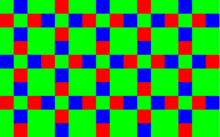Fujifilm X-Trans sensor


The Fujifilm X-Trans is a sensor with a colour filter array arrangement developed by Fujifilm and used in its Fujifilm X series cameras. Unlike most sensors featuring a conventional Bayer filter array, X-Trans sensors have a unique 6 by 6 pattern of photosites. Fujifilm claims that this layout can minimise moiré effects, and in turn increase resolution by eliminating the need for a low-pass filter.[1]
Details
[edit]Typical Bayer sensor arrays have RGB photosites in a repeated 2 by 2 pattern. When it overlaps with a regular pattern that is being captured, a new interference pattern can occur that does not exist in real life. In contrast, X-Trans sensors have a more irregular pattern of RGB photosites than conventional Bayer array sensors,[2] reducing the likelihood of interference and removing a need for a low-pass filter that lowers image resolution.[3]
Conventional Bayer sensors can also produce false colour as they do not have R and B photosites in some horizontal and vertical lines, Fujifilm claims that X-Trans sensors on the other hand have an improved colour reproduction due to all horizontal and vertical lines containing at least one R, G and B pixel out of every 6.[4]
Fuji claims that APS-C sized X-Trans sensors, while being physically smaller, have a greater perceived resolution than the number of pixels on the sensor and are said to be on par with some full frame sensors.[4]
While the first three generations of X-Trans sensors are front-illuminated, the fourth generation uses the principle of backside illumination. This improves noise levels and image quality.[5][6]
Drawbacks
[edit]Image artifacts
[edit]Under certain conditions, cameras equipped with X-Trans II and III sensors can exhibit purple flare/grid artifacts in backlit photos.[7] This occurs due to the particular arrangement of the phase detection and masking layers on the sensor. The appearance of the effect can vary with the demosaicing algorithms in use.
Future development
[edit]In an interview with DPreview during the CP+ 2017 show in Yokohama, Japan Fujifilm confirmed that an X-Trans sensor array is to be used for its next generation of APS-C sized sensors,[8] whilst larger medium format sensors will continue using a conventional Bayer array because of the increased processing requirements of X-Trans filter arrangement.
List of X-Trans sensors
[edit]| Sensor Model | Number of effective pixels | Total number of pixels | Sensor type | Sensor size | First announcement date | Utilizing cameras |
|---|---|---|---|---|---|---|
| X-Trans[9] | 16.3 MP | 23.6 mm x 15.6 mm (APS-C) | 9 January 2012[4] | Fujifilm X-Pro1 | ||
| X-Trans II[10] | 16.3 MP | 16.7 MP | 23.6 mm x 15.6 mm (APS-C) | 7 January 2013[11] | Fujifilm X100S
Fujifilm X-E2s | |
| 12 MP[12] | 14.5 MP[13] | 2/3-inch | 7 January 2013[12] | Fujifilm X20 | ||
| X-Trans III[14] | 24.3 MP | 23.6 mm x 15.6 mm (APS-C) | 14 January 2016[15] | Fujifilm X-Pro2 | ||
| X-Trans 4[16] | 26.1 MP | BSI | 23.5 mm x 15.6 mm[17] (APS-C) | 20 September 2018[16] | Fujifilm X-T3 | |
| X-Trans 5 HS[18] | 26.16 MP | BSI, Stacked | 23.6 mm x 15.6 mm (APS-C) | 31 May 2022[19] | Fujifilm X-H2S | |
| X-Trans 5 HR[18] | 40 MP | BSI | 23.6 mm x 15.6 mm (APS-C) | 8 September 2022[18] |
Fujifilm X-T50 |
References
[edit]- ^ "Fujifilm X-Trans sensor technology". Fujifilm. Archived from the original on 2017-01-13. Retrieved 2017-01-12.
- ^ "Fujifilm X-Pro1 | Features - APS-C 16M "X-Trans CMOS" | Fujifilm USA". www.fujifilmusa.com. Archived from the original on 2020-05-26. Retrieved 2017-01-12.
- ^ US 8531563, Tanaka, Seiji, "Color imaging apparatus", issued 2013-09-10, assigned to Fujifilm
- ^ a b c "Fujifilm introduces the revolutionary x-pro1 interchangeable lens digital camera system | Press Center | Fujifilm USA". www.fujifilmusa.com. Archived from the original on 2020-03-17. Retrieved 2017-01-12.
- ^ "Feature | The 4th Generation". fujifilm-x.com. Retrieved 2022-02-23.
- ^ Etchells, Dave. "What's the story with Fujifilm's X-Trans sensor tech? Is it really all that different?". imaging-resource.com. Retrieved 2022-02-23.
- ^ "Why and How Fuji Cameras Produce a Strange Purple Flare/Grid Artifact". PetaPixel. 2017-02-23. Retrieved 2017-02-26.
- ^ "CP+ 2017 - Fujifilm Interview: 'We hope that the GFX will change how people view medium format'". dpreview.com. Retrieved 2017-02-25.
- ^ "Fujifilm X-Pro1 - Specifications | Fujifilm USA". www.fujifilmusa.com. Archived from the original on 2017-01-13. Retrieved 2017-01-12.
- ^ "Fujifilm X-T1". Fujifilm Global. Retrieved 2017-01-12.
- ^ "Fujifilm X100S: Fujifilm launches a high-speed successor to the X100 with the world's fastest AF of 0.08 seconds". Fujifilm Global. Archived from the original on 2016-03-06. Retrieved 2017-01-13.
- ^ a b "Fujifilm X20: Reconnecting style with substance, bringing the essence of photography back to life". Fujifilm Global. Archived from the original on 2016-03-04. Retrieved 2017-01-12.
- ^ "Specifications XQ1 | Fujifilm United Kingdom". Fujifilm. Archived from the original on 2017-01-16. Retrieved 2017-01-12.
- ^ "Taking performance to new heights, the Fujifilm X-Pro2 offers the world's only Hybrid Multi Viewfinder and features a brand new 24MP X-Trans III sensor". Fujifilm Global. Retrieved 2017-01-12.
- ^ "Fujifilm announces new flagship X-Pro2 mirrorless camera | Press Center | Fujifilm USA". www.fujifilmusa.com. Archived from the original on 2017-01-13. Retrieved 2017-01-13.
- ^ a b "X Series' continued evolution into the 4th generation, Fujifilm launches new mirrorless digital camera "FUJIFILM X-T3"". Fujifilm Global. Retrieved 2018-09-06.
- ^ "FUJIFILM X-T3 | Specifications". www.fujifilm.com. Retrieved 2018-09-06.
- ^ a b c "X-Trans CMOS". fujifilm-x.com. Retrieved 3 July 2022.
- ^ "Fujifilm launches mirrorless digital camera "FUJIFILM X-H2S"". www.fujifilm.com. Retrieved 3 July 2022.
